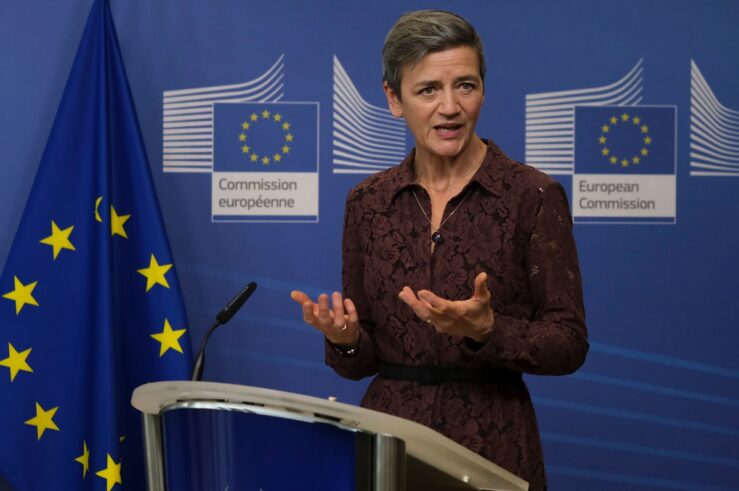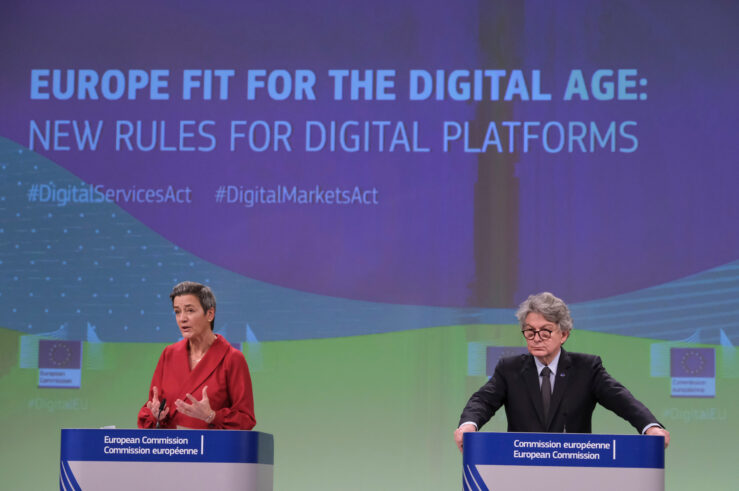Showing results for: “fama french”
Apple Fined at the 11th Hour Before the DMA Enters into Force
Just days before the EU’s Digital Markets Act (DMA) was set to enter into force, the European Commission hit Apple—one of the six designated “gatekeepers” to which the new law will apply—with a hefty €1.8 billion fine for the kinds of anti-steering provisions that will be banned by the DMA, which enters into force on ... Apple Fined at the 11th Hour Before the DMA Enters into Force
EU’s Cybersecurity Draft Shifts Toward Hard Protectionism
A year ago, we cautioned that the EU Cybersecurity Certification Scheme for Cloud Services (EUCS) threatened to embed ill-conceived economic protectionism into the EU’s cybersecurity rules. And, indeed, the European Commission, which has made clear its commitment to pursue “digital sovereignty” for the European Union, can claim some preliminary successes on that front. A recent ... EU’s Cybersecurity Draft Shifts Toward Hard Protectionism
Gatekeeping, the DMA, and the Future of Competition Regulation
The European Commission late last month published the full list of its “gatekeeper” designations under the Digital Markets Act (DMA). Alphabet, Amazon, Apple, ByteDance, Meta, and Microsoft—the six designated gatekeepers—now have six months to comply with the DMA’s list of obligations and restrictions with respect to their core platform services (CPS), or they stand to ... Gatekeeping, the DMA, and the Future of Competition Regulation
The FTC, DOJ, and International Competition Law: Convergence Away From the Consumer Welfare Standard?
In less than two and a half years, the Federal Trade Commission (FTC) and U.S. Justice Department (DOJ) have undone more than two decades of work aimed at moving global competition law toward an economics-friendly consumer welfare standard. In tandem with foreign competition authorities, the U.S. antitrust agencies are now cooperating in an effort to ... The FTC, DOJ, and International Competition Law: Convergence Away From the Consumer Welfare Standard?
Right to Anonymous Speech, Part 3: Anonymous Speech and Age-Verification Laws
An issue that came up during a terrific panel that I participated in last Thursday—organized by the Federalist Society’s Regulatory Transparency Project—was whether age-verification laws for social-media use infringed on a First Amendment right of either adults or minors to receive speech anonymously. My co-panelist Clare Morell of the Ethics and Public Policy Center put ... Right to Anonymous Speech, Part 3: Anonymous Speech and Age-Verification Laws
Goodbye Margrethe, Hello Didier: What Next for European Competition Law?
European Commissioner for Competition Margrethe Vestager announced Sept. 5 that she was leaving her position after nearly a decade in charge, which for the last four years has also included holding the title of “executive vice president of the European Commission for a Europe fit for the Digital Age.” Her departure caps off an uncharacteristically ... Goodbye Margrethe, Hello Didier: What Next for European Competition Law?
Digital-Market Regulation: One Size Does Not Fit All
Regulators around the globe are scrambling for a silver bullet to “tame” tech companies. Whether it’s the United States, the United Kingdom, Australia, South Africa, or Canada, the animating rationale behind such efforts is that firms like Google, Apple, Meta, and Amazon (GAMA) engage in undesirable market conduct that falls beyond the narrow purview of antitrust law (here and here). To tackle these supposed ... Digital-Market Regulation: One Size Does Not Fit All
FTC Biweekly UMC Roundup – Mountain of Puffery Edition
Research still matters, so I recommend video from the Federal Trade Commission’s 15th Annual Microeconomics Conference, if you’ve not already seen it. It’s a valuable event, and it’s part of the FTC’s still important statutory-research mission. It also reminds me that the FTC’s excellent, if somewhat diminished, Bureau of Economics still has no director; Marta ... FTC Biweekly UMC Roundup – Mountain of Puffery Edition
How Not to Use Industrial Policy to Promote Europe’s Digital Sovereignty
The concept of European “digital sovereignty” has been promoted in recent years both by high officials of the European Union and by EU national governments. Indeed, France made strengthening sovereignty one of the goals of its recent presidency in the EU Council. The approach taken thus far both by the EU and by national authorities ... How Not to Use Industrial Policy to Promote Europe’s Digital Sovereignty
The Case Against Self-Preferencing as a New Antitrust Offense
The practice of so-called “self-preferencing” has come to embody the zeitgeist of competition policy for digital markets, as legislative initiatives are undertaken in jurisdictions around the world that to seek, in various ways, to constrain large digital platforms from granting favorable treatment to their own goods and services. The core concern cited by policymakers is ... The Case Against Self-Preferencing as a New Antitrust Offense
The Road to Antitrust’s Least Glorious Hour
Things are heating up in the antitrust world. There is considerable pressure to pass the American Innovation and Choice Online Act (AICOA) before the congressional recess in August—a short legislative window before members of Congress shift their focus almost entirely to campaigning for the mid-term elections. While it would not be impossible to advance the ... The Road to Antitrust’s Least Glorious Hour
A Day in the Fair New World of Perfectly Open Platforms
Early Morning I wake up grudgingly to the loud ring of my phone’s preset alarm sound (I swear I gave third-party alarms a fair shot). I slide my feet into the bedroom slippers and mechanically chaperone my body to the coffee machine in the living room. “Great,” I think to myself, “Out of capsules, again.” ... A Day in the Fair New World of Perfectly Open Platforms















